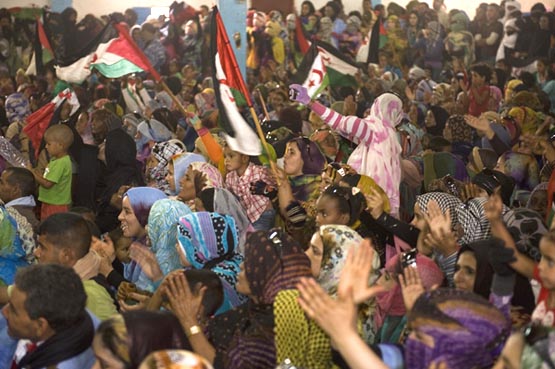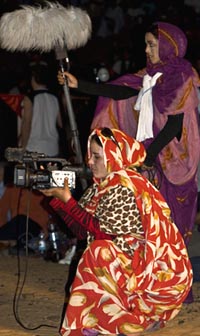
During the 1960s, when decolonization movements were sweeping the world, it was joked that after achieving independence a country had to do three things: design a flag, launch an airline and found a film festival.
An estimated 165,000 Saharawi people that fled their native
A film festival might seem light the last thing needed by refugees who are dependent on external aid for virtually all their basic needs. Yet the festival organizers regard culture as an important and much overlooked aspect of social progress, essential for maintaining the spirit and identity of a people who have lived in exile over 35 years. FiSahara takes place in Dakhla, the most isolated of four camps in a region know as ‘the Devil’s garden’. It is 130 miles from the nearest town and home to around 30,000 Saharawi refugees. There are no paved roads, no sources of water, no vegetation and in the summer months temperatures regularly top 120F. And yet once a year Dahlka plays host to a gala of screenings, concerts and workshops attended by around 400 actors, directors and film industry insiders from around the world.

The program boasts an eclectic mix of over 30 films including several about the experience of the Saharawis, some made by Saharawi refugees themselves. Other films offer the refugees a window to the rest of the world: an audience of over 300 refugees sat for two hours captivated by films such as Ken Loaches Looking for Eric, the story of a postman living in a
Despite his failing eyesight, seventy-year-old Salek Sahah Yahia sat through El Problema, a film exploring the history of the crisis in
For Deiga Aklaminhom, who is 32 and has lived her entire life in Dakhla, FiSahara offers a welcome break from the monotony of life as a refugee. "I have been waiting all year for this week to come," she smiled. "For me the workshops have been so wonderful." Over a dozen workshops are run by film industry professionals offering refugees access to film-making equipment and audio-visual training. This year, twenty Britons from the Caravanserai acting studio ran a joint workshop with a film director to teach potential Saharawi film-makers how to work with actors. “There was one moment during the workshop when a scene we were developing about the torture of a hunger striker slipped into ultra realism” recalls acting coach Giles Forman. “It was incredibly intense and despite cultural and linguistic barriers I’m certain that everyone in that room had goose pimples.” It is this form of cultural interchange that makes FiSahara so remarkable. All visitors, including the celebrities, stay with Saharawi families, sharing their home and their food and talking leisurely over endless glasses of sweet Sahawari tea.
On the last day, festival-goers gathered for the opening of a new radio, film and television school built in a neighboring camp. The school will provide technical training and the work produced there will form part of the program of future festivals. According to Jadiya Hamdi, Minister of Culture of the Saharawi government in exile, engaging young people in film-making not only sustains and energizes Saharawi culture but also gives these forgotten people a sense of purpose. "Empty time is a dangerous thing," she said. "It can kill a human soul."
Stefan Simanowitz is a journalist, broadcaster and human rights campaigner. If you would like to help the Saharawi people or get involved in the film festival visit www.freesahara.ning.com
Photos by Robert Griffin
